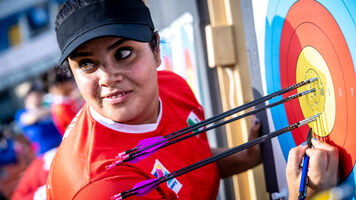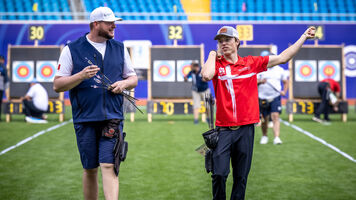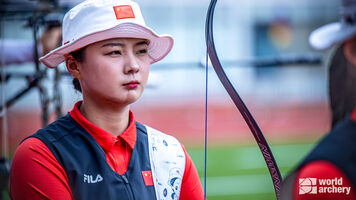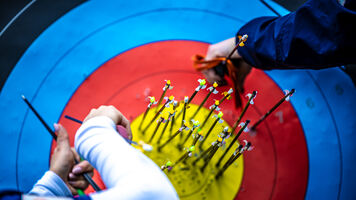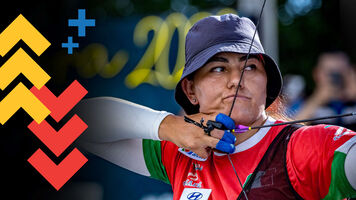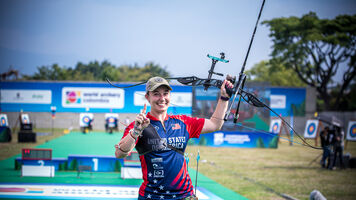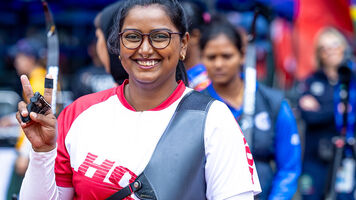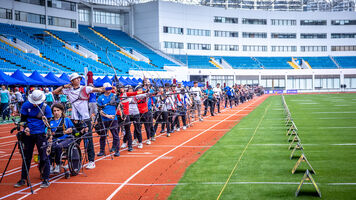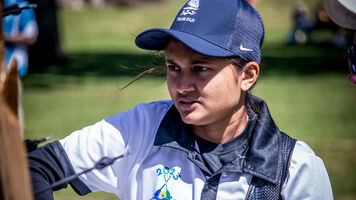This content is archived and as has not been processed. It may contain unformatted text or images, broken links or out-of-date information.
Archive
20 January 2010 - Berengere SCHUH (FRA): "My goal? To win an Olympic gold"
Lausanne
Berengere SCHUH (FRA): "My goal? To win an Olympic gold"
Lausanne - 20 January 2010
Berengere SCHUH is the leading French archer in the recurve women’s category. World indoor champion in 2003, 2nd in 2007 and 3rd in 2009, she is also the world indoor record holder. In 2008 after becoming outdoor European champion, Berengere led her French team to the bronze medal at the Beijing Olympic Games. Berengere, 25, just won the Tournament of Nimes on Sunday.
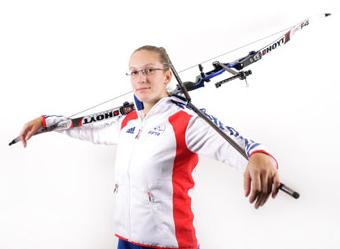 Some outdoor champions like Romain GIROUILLE (FRA) admitted that they don’t like indoor archery. The contrary seems to happen in your case: you became world indoor champion in Nimes in 2003 – your first success in a major senior international competition. Was that the moment when everything started for you?
Yes. My international career really started at that moment, even though I had been European outdoor cadet champion in 1999, which also counted! Most of my early successes came in indoor archery. This all changed in 2008 with my European outdoor title in Vittel (FRA). It was my very first major success in outdoor archery. This title made me confident that I was able to shoot well in both disciplines. I think it helped me be among the favourites for the individual competition at the Beijing Olympics. At that competition I won the bronze medal with my team. I must say the European outdoor title acted like a trigger for me.
You are now a favourite in both disciplines. Does it help you set new goals for your career?
Of course, especially in outdoor archery. I want to win a medal in a World Championships. It might not happen next year, but hopefully at least once in my career! And I want to win a medal at the Olympic Games, of course! So I would have all the titles (she laughs)!
Some outdoor champions like Romain GIROUILLE (FRA) admitted that they don’t like indoor archery. The contrary seems to happen in your case: you became world indoor champion in Nimes in 2003 – your first success in a major senior international competition. Was that the moment when everything started for you?
Yes. My international career really started at that moment, even though I had been European outdoor cadet champion in 1999, which also counted! Most of my early successes came in indoor archery. This all changed in 2008 with my European outdoor title in Vittel (FRA). It was my very first major success in outdoor archery. This title made me confident that I was able to shoot well in both disciplines. I think it helped me be among the favourites for the individual competition at the Beijing Olympics. At that competition I won the bronze medal with my team. I must say the European outdoor title acted like a trigger for me.
You are now a favourite in both disciplines. Does it help you set new goals for your career?
Of course, especially in outdoor archery. I want to win a medal in a World Championships. It might not happen next year, but hopefully at least once in my career! And I want to win a medal at the Olympic Games, of course! So I would have all the titles (she laughs)!
The level of international competition is very high, a little higher than the European level, mainly because the Korean and Chinese archers do not compete at the European level. Speaking about favourites, I don’t have enough self-confidence to consider myself as one of them.
How come you lack confidence, knowing that you are European and world champion and an Olympic medallist? This has always been the case, even in everyday life. I am a big perfectionist and try to shoot the perfect arrow everytime. But such an arrow doesn't exist. I set myself goals that are very difficult to reach. When I get good results, I gain some confidence. On the contrary, when I fail in a competition, I lose my confidence again. I take one step forward when my shooting goes well and three or four steps backwards when something goes wrong. I would say my average confidence level ranges from 60 to 70%. Do the lacking 30-40% percent push you to move forward? In a way, yes. The day I will be fully confident in my capacities, I will be very difficult to beat. You mentioned the Korean archers. What do you think about them? In 2007, I thought the Korean archers were unbeatable both as a team and individually. Today, they are almost impossible to beat as a team. However when they shoot individually, it's possible to beat them. For example, the 2008 Olympic individual title went to a Chinese archer, ZHANG Juan Juan. Korea's PARK Sung-Hyun lost her Olympic title, after losing her world title against Natalia VALEEVA from Italy. We now know we can beat the Koreans: I beat one of them this year. I am a lot less nervous to shoot against them in the individual events than in the team competition. Do you know what these archers think about you? That's a very good question. I'm precisely working on it with my coach, Marc DELLENBACH: people’s perception of me. I put a lot of pressure on myself according to my opponent's previous results, and I don't think they do the same when they shoot against me. They don't seem nervous, as though they were shooting against someone with no major achievements. In 2008 my coach started to show me during all of my matches the "signs" proving that my opponents are nervous, like if they are shaking or have difficulties to shoot well. I was not aware of it before. I'm starting to realise that some archers are scared to shoot against me. I still have a lot to learn in that respect. Concretely, I must tell myself that my opponent and I share the same fear. Does this mean you should work more on the mental aspect or the technique? Maybe an experienced archer like you doesn't need to work on the technique anymore.
It's exactly the opposite. This season I am working on adapting my technique in order to become better than last year and stronger on the physical plan. The competitive season is long. For example I competed back-to-back in the World Cup Final last September and the European Club Teams Cup. The season was long and it's hard to stay in good shape physically. Most of all, I hope my preparation will help decrease the number of technical mistakes.
Do you think this technical work will help you become stronger mentally as well?
Yes, probably. If I become stronger physically, it will help me get stronger mentally as well. For now I need to get used to my new shooting technique and it's a lot of work. Then I will try to apply it in competition and shoot in the yellow ring. Once I will be used to my technical changes and my performance will be top-level again, the consequence should be an improvement on the mental level and in my confidence. My goal is to win as many competitions as possible and beat more and more records. I know how to do this. And if I don't shoot good results next season, I will work even more. My major objective is to be 100% ready for the 2012 Olympic Games in London – on the physical, technical and mental plan.
Now let's look back at your 2009 season. You won several medals and broke some records, including the world record at 2x18 metres during the World Indoor Championships in Poland. What's more you qualified for your first World Cup Final in outdoor archery. What can you say about these great achievements?
I had two goals in indoor archery: to become world champion and break the world record. In February 2009, I shot 591 points out of a possible 600 in a regional competition. So I shot the score of the world record for the second time in my career. I was a little disappointed to come so close to breaking it. I promised the French journalists that I would try to win the world title and break the record at the same time. I knew I would be the one to beat. It was not going to be easy, since I tend to not shoot so well in qualifications. But this time, I started the World Indoor Championships with a perfect end of 30! I then shot 27 and 28, losing 5 points in three ends. I thought I wouldn't break the world record that day, but Marc cheered me up. I started to shoot one end of 30 after another. After the first series I had a total of 294 points out of 300. I was in 3rd place, very far from the world record. In the second series (6 ends) I scored a perfect total of 180. I shot a 9 in the 7th end (29), then 30 and 30 again before the very last end. I started to think about the world record that was now within my reach. The pressure was huge. I shot a 10, followed by another 10. It was so stressful. On my last arrow I needed a 9 to break the record, and 9 I did! I had reached one of my two goals, but had difficulties concentrating after this. In the semifinal I lost against the future champion WINTER (GER). It was very hard to recover from this defeat. The next day I met Nami HAYAKAWA (JPN) in the final for the bronze medal. I had lost against her in the gold medal final at the previous World Indoor Championships two years before, and wanted to take revenge! I was not very focused but managed to win by just one point, 115-114. I have very good memories from this match, even though I had dreamed to qualify for the final against VALEEVA (ITA). The outdoor season started just three weeks later with the World Cup stage 1 in Santo Domingo (DOM). I was confident and broke several records. I broke the French record with 1361 points out of a possible 1440, set a new French record at 2x70 metres with 675 points at the end of the season. I think I proved my fellow competitors that I can be a dangerous opponent even in outdoor archery.
Does this mean you should work more on the mental aspect or the technique? Maybe an experienced archer like you doesn't need to work on the technique anymore.
It's exactly the opposite. This season I am working on adapting my technique in order to become better than last year and stronger on the physical plan. The competitive season is long. For example I competed back-to-back in the World Cup Final last September and the European Club Teams Cup. The season was long and it's hard to stay in good shape physically. Most of all, I hope my preparation will help decrease the number of technical mistakes.
Do you think this technical work will help you become stronger mentally as well?
Yes, probably. If I become stronger physically, it will help me get stronger mentally as well. For now I need to get used to my new shooting technique and it's a lot of work. Then I will try to apply it in competition and shoot in the yellow ring. Once I will be used to my technical changes and my performance will be top-level again, the consequence should be an improvement on the mental level and in my confidence. My goal is to win as many competitions as possible and beat more and more records. I know how to do this. And if I don't shoot good results next season, I will work even more. My major objective is to be 100% ready for the 2012 Olympic Games in London – on the physical, technical and mental plan.
Now let's look back at your 2009 season. You won several medals and broke some records, including the world record at 2x18 metres during the World Indoor Championships in Poland. What's more you qualified for your first World Cup Final in outdoor archery. What can you say about these great achievements?
I had two goals in indoor archery: to become world champion and break the world record. In February 2009, I shot 591 points out of a possible 600 in a regional competition. So I shot the score of the world record for the second time in my career. I was a little disappointed to come so close to breaking it. I promised the French journalists that I would try to win the world title and break the record at the same time. I knew I would be the one to beat. It was not going to be easy, since I tend to not shoot so well in qualifications. But this time, I started the World Indoor Championships with a perfect end of 30! I then shot 27 and 28, losing 5 points in three ends. I thought I wouldn't break the world record that day, but Marc cheered me up. I started to shoot one end of 30 after another. After the first series I had a total of 294 points out of 300. I was in 3rd place, very far from the world record. In the second series (6 ends) I scored a perfect total of 180. I shot a 9 in the 7th end (29), then 30 and 30 again before the very last end. I started to think about the world record that was now within my reach. The pressure was huge. I shot a 10, followed by another 10. It was so stressful. On my last arrow I needed a 9 to break the record, and 9 I did! I had reached one of my two goals, but had difficulties concentrating after this. In the semifinal I lost against the future champion WINTER (GER). It was very hard to recover from this defeat. The next day I met Nami HAYAKAWA (JPN) in the final for the bronze medal. I had lost against her in the gold medal final at the previous World Indoor Championships two years before, and wanted to take revenge! I was not very focused but managed to win by just one point, 115-114. I have very good memories from this match, even though I had dreamed to qualify for the final against VALEEVA (ITA). The outdoor season started just three weeks later with the World Cup stage 1 in Santo Domingo (DOM). I was confident and broke several records. I broke the French record with 1361 points out of a possible 1440, set a new French record at 2x70 metres with 675 points at the end of the season. I think I proved my fellow competitors that I can be a dangerous opponent even in outdoor archery.
I was 1st in the World Cup ranking before the Final in Copenhagen (DEN), even though I had a bad competition, placing 4th. I was very nervous, it was my first World Cup Final and I had never shot above water before that. European Outdoor Champion 2008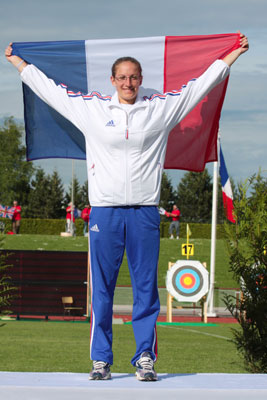 A lot of archers come to you during the events.
How do you react to it?
Yes, a lot of archers come to me during competitions, they ask me questions and shake my hand (she laughs)! I never refuse to give autographs or answer questions. It's a matter of limits: if someone disturbs me during the competition, I tell them to come after it's over. In general the archers respect each other and don't interrupt people during the competition.
A lot of archers come to you during the events.
How do you react to it?
Yes, a lot of archers come to me during competitions, they ask me questions and shake my hand (she laughs)! I never refuse to give autographs or answer questions. It's a matter of limits: if someone disturbs me during the competition, I tell them to come after it's over. In general the archers respect each other and don't interrupt people during the competition.
I would like to tell you about the Tournament of Nimes two years ago. I was shooting the final against Lisa UNRUH (GER). Everybody was cheering for me. What's more, Nimes is the place where I became world indoor champion in 2003, I'm like the « mascot » there! There is a big amount of pressure in that competition: when the audience of archers cheers you on, you have to give the example and cannot let them down! I really want to give a good image, even though I'm not always perfect technically (laughs)!
Finally, one last question. Imagine that you become Olympic champion in London in two years. How would you feel about it? (She pauses to think…) I'm not planning to quit after the 2012 Games, no matter the results. To become Olympic champion is the outcome of hours and hours of training and dedication. An Olympic medal is the best possible reward, even if it's not the gold, because it means all the hard work has paid off. Actually, the worst thing is to fail in an event. When you put so much work into preparation and leave a competition empty-handed, you start torturing yourself about why you didn't win a medal, what happened, is it your fault, is it your technique or is it the bow, and so on. The real question is how to go back to a positive sporting spirit focused on success, gain back your confidence in yourself and in your technique, your material. At the Olympics, if you're at 100% of your mental, physical and technical capacities, you can make it. All this has to be considered from the perspective of elite sports. In my opinion the goal of any elite athlete is to win an Olympic gold. I understand the people who practice archery as a hobby, in order to relax and clear their mind after work, or for pleasure. This other aspect of our sport is also very important.
Interview Jean-Denis GITTON (FFTA Communication)
Photos Jean-Denis GITTON (FFTA Communication)
Edited by FITA Communication
 Some outdoor champions like Romain GIROUILLE (FRA) admitted that they don’t like indoor archery. The contrary seems to happen in your case: you became world indoor champion in Nimes in 2003 – your first success in a major senior international competition. Was that the moment when everything started for you?
Yes. My international career really started at that moment, even though I had been European outdoor cadet champion in 1999, which also counted! Most of my early successes came in indoor archery. This all changed in 2008 with my European outdoor title in Vittel (FRA). It was my very first major success in outdoor archery. This title made me confident that I was able to shoot well in both disciplines. I think it helped me be among the favourites for the individual competition at the Beijing Olympics. At that competition I won the bronze medal with my team. I must say the European outdoor title acted like a trigger for me.
You are now a favourite in both disciplines. Does it help you set new goals for your career?
Of course, especially in outdoor archery. I want to win a medal in a World Championships. It might not happen next year, but hopefully at least once in my career! And I want to win a medal at the Olympic Games, of course! So I would have all the titles (she laughs)!
Some outdoor champions like Romain GIROUILLE (FRA) admitted that they don’t like indoor archery. The contrary seems to happen in your case: you became world indoor champion in Nimes in 2003 – your first success in a major senior international competition. Was that the moment when everything started for you?
Yes. My international career really started at that moment, even though I had been European outdoor cadet champion in 1999, which also counted! Most of my early successes came in indoor archery. This all changed in 2008 with my European outdoor title in Vittel (FRA). It was my very first major success in outdoor archery. This title made me confident that I was able to shoot well in both disciplines. I think it helped me be among the favourites for the individual competition at the Beijing Olympics. At that competition I won the bronze medal with my team. I must say the European outdoor title acted like a trigger for me.
You are now a favourite in both disciplines. Does it help you set new goals for your career?
Of course, especially in outdoor archery. I want to win a medal in a World Championships. It might not happen next year, but hopefully at least once in my career! And I want to win a medal at the Olympic Games, of course! So I would have all the titles (she laughs)! The level of international competition is very high, a little higher than the European level, mainly because the Korean and Chinese archers do not compete at the European level. Speaking about favourites, I don’t have enough self-confidence to consider myself as one of them.
How come you lack confidence, knowing that you are European and world champion and an Olympic medallist? This has always been the case, even in everyday life. I am a big perfectionist and try to shoot the perfect arrow everytime. But such an arrow doesn't exist. I set myself goals that are very difficult to reach. When I get good results, I gain some confidence. On the contrary, when I fail in a competition, I lose my confidence again. I take one step forward when my shooting goes well and three or four steps backwards when something goes wrong. I would say my average confidence level ranges from 60 to 70%. Do the lacking 30-40% percent push you to move forward? In a way, yes. The day I will be fully confident in my capacities, I will be very difficult to beat. You mentioned the Korean archers. What do you think about them? In 2007, I thought the Korean archers were unbeatable both as a team and individually. Today, they are almost impossible to beat as a team. However when they shoot individually, it's possible to beat them. For example, the 2008 Olympic individual title went to a Chinese archer, ZHANG Juan Juan. Korea's PARK Sung-Hyun lost her Olympic title, after losing her world title against Natalia VALEEVA from Italy. We now know we can beat the Koreans: I beat one of them this year. I am a lot less nervous to shoot against them in the individual events than in the team competition. Do you know what these archers think about you? That's a very good question. I'm precisely working on it with my coach, Marc DELLENBACH: people’s perception of me. I put a lot of pressure on myself according to my opponent's previous results, and I don't think they do the same when they shoot against me. They don't seem nervous, as though they were shooting against someone with no major achievements. In 2008 my coach started to show me during all of my matches the "signs" proving that my opponents are nervous, like if they are shaking or have difficulties to shoot well. I was not aware of it before. I'm starting to realise that some archers are scared to shoot against me. I still have a lot to learn in that respect. Concretely, I must tell myself that my opponent and I share the same fear.
 Does this mean you should work more on the mental aspect or the technique? Maybe an experienced archer like you doesn't need to work on the technique anymore.
It's exactly the opposite. This season I am working on adapting my technique in order to become better than last year and stronger on the physical plan. The competitive season is long. For example I competed back-to-back in the World Cup Final last September and the European Club Teams Cup. The season was long and it's hard to stay in good shape physically. Most of all, I hope my preparation will help decrease the number of technical mistakes.
Do you think this technical work will help you become stronger mentally as well?
Yes, probably. If I become stronger physically, it will help me get stronger mentally as well. For now I need to get used to my new shooting technique and it's a lot of work. Then I will try to apply it in competition and shoot in the yellow ring. Once I will be used to my technical changes and my performance will be top-level again, the consequence should be an improvement on the mental level and in my confidence. My goal is to win as many competitions as possible and beat more and more records. I know how to do this. And if I don't shoot good results next season, I will work even more. My major objective is to be 100% ready for the 2012 Olympic Games in London – on the physical, technical and mental plan.
Now let's look back at your 2009 season. You won several medals and broke some records, including the world record at 2x18 metres during the World Indoor Championships in Poland. What's more you qualified for your first World Cup Final in outdoor archery. What can you say about these great achievements?
I had two goals in indoor archery: to become world champion and break the world record. In February 2009, I shot 591 points out of a possible 600 in a regional competition. So I shot the score of the world record for the second time in my career. I was a little disappointed to come so close to breaking it. I promised the French journalists that I would try to win the world title and break the record at the same time. I knew I would be the one to beat. It was not going to be easy, since I tend to not shoot so well in qualifications. But this time, I started the World Indoor Championships with a perfect end of 30! I then shot 27 and 28, losing 5 points in three ends. I thought I wouldn't break the world record that day, but Marc cheered me up. I started to shoot one end of 30 after another. After the first series I had a total of 294 points out of 300. I was in 3rd place, very far from the world record. In the second series (6 ends) I scored a perfect total of 180. I shot a 9 in the 7th end (29), then 30 and 30 again before the very last end. I started to think about the world record that was now within my reach. The pressure was huge. I shot a 10, followed by another 10. It was so stressful. On my last arrow I needed a 9 to break the record, and 9 I did! I had reached one of my two goals, but had difficulties concentrating after this. In the semifinal I lost against the future champion WINTER (GER). It was very hard to recover from this defeat. The next day I met Nami HAYAKAWA (JPN) in the final for the bronze medal. I had lost against her in the gold medal final at the previous World Indoor Championships two years before, and wanted to take revenge! I was not very focused but managed to win by just one point, 115-114. I have very good memories from this match, even though I had dreamed to qualify for the final against VALEEVA (ITA). The outdoor season started just three weeks later with the World Cup stage 1 in Santo Domingo (DOM). I was confident and broke several records. I broke the French record with 1361 points out of a possible 1440, set a new French record at 2x70 metres with 675 points at the end of the season. I think I proved my fellow competitors that I can be a dangerous opponent even in outdoor archery.
Does this mean you should work more on the mental aspect or the technique? Maybe an experienced archer like you doesn't need to work on the technique anymore.
It's exactly the opposite. This season I am working on adapting my technique in order to become better than last year and stronger on the physical plan. The competitive season is long. For example I competed back-to-back in the World Cup Final last September and the European Club Teams Cup. The season was long and it's hard to stay in good shape physically. Most of all, I hope my preparation will help decrease the number of technical mistakes.
Do you think this technical work will help you become stronger mentally as well?
Yes, probably. If I become stronger physically, it will help me get stronger mentally as well. For now I need to get used to my new shooting technique and it's a lot of work. Then I will try to apply it in competition and shoot in the yellow ring. Once I will be used to my technical changes and my performance will be top-level again, the consequence should be an improvement on the mental level and in my confidence. My goal is to win as many competitions as possible and beat more and more records. I know how to do this. And if I don't shoot good results next season, I will work even more. My major objective is to be 100% ready for the 2012 Olympic Games in London – on the physical, technical and mental plan.
Now let's look back at your 2009 season. You won several medals and broke some records, including the world record at 2x18 metres during the World Indoor Championships in Poland. What's more you qualified for your first World Cup Final in outdoor archery. What can you say about these great achievements?
I had two goals in indoor archery: to become world champion and break the world record. In February 2009, I shot 591 points out of a possible 600 in a regional competition. So I shot the score of the world record for the second time in my career. I was a little disappointed to come so close to breaking it. I promised the French journalists that I would try to win the world title and break the record at the same time. I knew I would be the one to beat. It was not going to be easy, since I tend to not shoot so well in qualifications. But this time, I started the World Indoor Championships with a perfect end of 30! I then shot 27 and 28, losing 5 points in three ends. I thought I wouldn't break the world record that day, but Marc cheered me up. I started to shoot one end of 30 after another. After the first series I had a total of 294 points out of 300. I was in 3rd place, very far from the world record. In the second series (6 ends) I scored a perfect total of 180. I shot a 9 in the 7th end (29), then 30 and 30 again before the very last end. I started to think about the world record that was now within my reach. The pressure was huge. I shot a 10, followed by another 10. It was so stressful. On my last arrow I needed a 9 to break the record, and 9 I did! I had reached one of my two goals, but had difficulties concentrating after this. In the semifinal I lost against the future champion WINTER (GER). It was very hard to recover from this defeat. The next day I met Nami HAYAKAWA (JPN) in the final for the bronze medal. I had lost against her in the gold medal final at the previous World Indoor Championships two years before, and wanted to take revenge! I was not very focused but managed to win by just one point, 115-114. I have very good memories from this match, even though I had dreamed to qualify for the final against VALEEVA (ITA). The outdoor season started just three weeks later with the World Cup stage 1 in Santo Domingo (DOM). I was confident and broke several records. I broke the French record with 1361 points out of a possible 1440, set a new French record at 2x70 metres with 675 points at the end of the season. I think I proved my fellow competitors that I can be a dangerous opponent even in outdoor archery. I was 1st in the World Cup ranking before the Final in Copenhagen (DEN), even though I had a bad competition, placing 4th. I was very nervous, it was my first World Cup Final and I had never shot above water before that. European Outdoor Champion 2008
 A lot of archers come to you during the events.
How do you react to it?
Yes, a lot of archers come to me during competitions, they ask me questions and shake my hand (she laughs)! I never refuse to give autographs or answer questions. It's a matter of limits: if someone disturbs me during the competition, I tell them to come after it's over. In general the archers respect each other and don't interrupt people during the competition.
A lot of archers come to you during the events.
How do you react to it?
Yes, a lot of archers come to me during competitions, they ask me questions and shake my hand (she laughs)! I never refuse to give autographs or answer questions. It's a matter of limits: if someone disturbs me during the competition, I tell them to come after it's over. In general the archers respect each other and don't interrupt people during the competition. I would like to tell you about the Tournament of Nimes two years ago. I was shooting the final against Lisa UNRUH (GER). Everybody was cheering for me. What's more, Nimes is the place where I became world indoor champion in 2003, I'm like the « mascot » there! There is a big amount of pressure in that competition: when the audience of archers cheers you on, you have to give the example and cannot let them down! I really want to give a good image, even though I'm not always perfect technically (laughs)!
Finally, one last question. Imagine that you become Olympic champion in London in two years. How would you feel about it? (She pauses to think…) I'm not planning to quit after the 2012 Games, no matter the results. To become Olympic champion is the outcome of hours and hours of training and dedication. An Olympic medal is the best possible reward, even if it's not the gold, because it means all the hard work has paid off. Actually, the worst thing is to fail in an event. When you put so much work into preparation and leave a competition empty-handed, you start torturing yourself about why you didn't win a medal, what happened, is it your fault, is it your technique or is it the bow, and so on. The real question is how to go back to a positive sporting spirit focused on success, gain back your confidence in yourself and in your technique, your material. At the Olympics, if you're at 100% of your mental, physical and technical capacities, you can make it. All this has to be considered from the perspective of elite sports. In my opinion the goal of any elite athlete is to win an Olympic gold. I understand the people who practice archery as a hobby, in order to relax and clear their mind after work, or for pleasure. This other aspect of our sport is also very important.
Interview Jean-Denis GITTON (FFTA Communication)
Photos Jean-Denis GITTON (FFTA Communication)
Edited by FITA Communication

